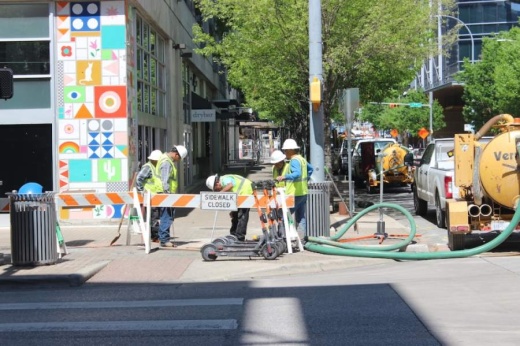“How are we addressing that calculation they’re making in their head where they know the risks but there is no protection for them economically should they not go to work?” Eric Tang, a faculty fellow at The University of Texas Institute for Urban Policy Research and Analysis, asked City Council on May 5. He urged officials to consider how federal funding could be used to offer a safety net to such workers.
Dr. Mark Escott, the Austin-Travis County interim health authority, said most of the worker infections come in the construction, health care and grocery industries—jobs that have been deemed essential since the beginning of Austin’s pandemic shutdown in March. Next week, Austin City Council will consider a measure that seeks additional protections for the most vulnerable in these industries.
The effort, led by District 4 City Council Member Greg Casar, asks the city to develop a program that ensures employers in the city are protecting high-risk employees by offering telework or safe working conditions. The direction also points to connecting all high-risk workers to unemployment insurance and pandemic unemployment assistance through the state. It also asks the city to ensure financial support is available for high-risk workers who do not qualify for the state assistance programs.
City Council Members Natasha Harper-Madison, Paige Ellis and Ann Kitchen have joined Casar in supporting the direction.
Ensuring access to paid sick time is another key element to slowing the virus’s spread and protecting workers. Casar said the city needs to make sure that high-risk Austinites who “do the right thing and stay home” are supported.
“We know that there are Austinites who are reluctant to take COVID tests, for fear that they will lose income if they test positive,” Casar wrote in a City Council message board post. “We also need to make sure people in symptomatic households do not go to work. We need to assist those Austinites so that they do not have to choose between their health and their economic survival.”
Earlier this week, Casar told Community Impact Newspaper that although financial assistance is key to getting the community through the pandemic, city leaders cannot forget that most resources need to be put toward medical efforts.
“We have to dedicate the largest chunk of federal dollars to beating the virus in the community,” Casar said. “Ultimately, if we don’t address the virus as the root cause of the economic catastrophe, we will never be able to catch up.”
Austin City Council will take up the resolution at its next meeting May 21.





